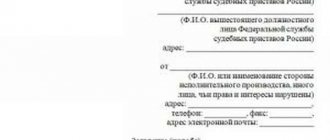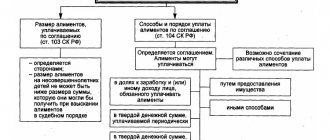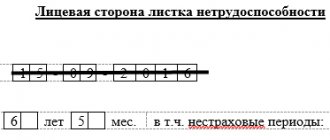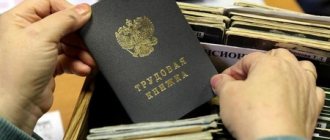The procedure for executing a court decision to write off debt
A court decision to collect a debt from an individual that is not executed voluntarily is transferred to bailiffs for forced collection. Execution of a court decision is carried out in accordance with the requirements of Federal Law dated October 2, 2007 N 229-FZ.
First of all, debt repayment will be carried out using funds in the accounts and deposits of individuals. If there is insufficient money in the accounts, repayment of the debt is carried out at the expense of other property of the debtor, which belongs to him by right of ownership.
Seizure and write-off - what is the difference between these measures
There is a difference between arrest and write-off, and it is significant. The seizure of property or funds in itself does not entail their seizure. This is a security measure that means blocking the movement of money, prohibiting their withdrawal or transfer. For example, when securing a claim in a lawsuit, the money will not be written off, but only a ban on its disposal will be imposed.
Typically, bailiffs begin a hold simultaneously with the imposition of an arrest. This is logical, since writing off money is the easiest way to comply with a court decision.
Therefore, in the resolution that goes to the bank, the bailiff will immediately indicate:
- information about the seizure of all accounts that are opened in the name of the defaulter;
- about the amount of debt for the repayment of which funds will be withheld;
- about the amount of deduction if money will be written off from certain types of income (salary, pension, benefits, etc.)
A copy of the resolution will be sent to the debtor. However, sending a document by mail can take several days or even weeks. Therefore, debtors often unexpectedly learn about write-offs from SMS and notifications in the online banking system. The later you find out about the lien, the more difficult it will be to get your money back.
Why does the bailiff block a salary card?
The recovery applies to all bank accounts of an individual, including those opened for salary cards. The answer to the question: how much bailiffs can withdraw from wages is very simple in this case. The write-off will be made in the full amount of the debt. If there is not enough money in the account, the salary card will be blocked. It will not be possible to make expenditure transactions from it until the amount specified in the writ of execution is repaid in full.
What to do in this case? How to remove the block? How long will it take for the bailiff to give you your salary? People who find themselves in a similar situation need to understand that they can avoid such troubles by fully repaying debts under court decisions.
Features of writing off funds
It is important to know the features of arresting and writing off money from different types of accounts. They differ significantly, and this information will be useful when filing complaints and refunds.
Salary
Most employers have long switched to non-cash payment of salaries via cards. It's faster and more convenient than dealing with cash and paying money through a cash register. Seizure of a salary account has the following features:
- no more than 50% can be withheld from wages, and for certain types of debts up to 70% (for example, if the debtor, in addition to the bank debt, also has alimony arrears);
- in the resolution, the bailiff indicates the maximum amount of deductions, but banks are now required to check this information as well;
- 50% is withheld from each salary deposit.
We recommend immediately withdrawing or spending the money remaining after writing off 50% of your salary. The bank has the right to write off the entire balance after the next part of the salary is credited. This rule is specified in Art. 99 of Law No. 229-FZ. Once the next periodic payment is received from the employer, the unwithdrawn money is no longer considered wages, so it is not subject to the 50% withholding limit.
Ekaterina Uryvaeva
Bankruptcy Lawyer for Individuals
Pensions, social benefits
A similar procedure applies when seizing a pension account. Deductions from it can be up to 70%, except for the survivor's pension. When transferring the next pension, the Pension Fund will indicate the payment purpose code. Using it, the bank will calculate the exact amount of deduction and write off the money. If your entire pension has been written off from your card, you can file a complaint and demand a refund.
For children's and social benefits, payment purpose codes are also indicated. If the payment cannot be collected, the bank does not have the right to write off the money. If a social benefit is subject to write-off, the amount of withholding cannot exceed 50 or 70%.
Please note that all social payments are now transferred only to cards of the Russian payment system “MIR”. Therefore, the bank knows in advance about the intended purpose of the money. But this does not mean that all the money coming to the MIR card is pensions or benefits. If violations were committed during write-off, you can file a complaint against the work of the bailiff in court.
Accounts with which you repay loans
The most difficult situation is when the accounts through which the debtor repays loans are seized. There are two possible options:
- if the bank debits money to repay the loan from the client’s regular account, they may be foreclosed on according to general rules (therefore, there may not be enough funds on the loan payment date);
- if money is deposited into a special credit account, it immediately becomes the property of the bank, and therefore it is not profitable for the bank to write it off. Especially if you are paying off this loan, and the arrest concerns debts to other financial institutions.
If you are a debtor, we recommend depositing loan money into a special account or through bank branches and terminals. If you put funds for the next payment on a regular card, they may not wait for the loan to be written off and will go to the FSSP deposit. Accordingly, you will automatically default on the loan schedule.
But keep in mind that in many banks, replenishing accounts through the branch’s cash desk has long been a paid service. For withdrawals and deposits of funds to the card account through the cash desk, they charge a commission, for example, VTB and Alfa-Bank.
When are wages garnished?
The bailiff sends the employer a writ of execution to collect debts from the employee if at least one of the following conditions is met (Article 98 229-FZ):
- periodic payments are collected;
- the debt does not exceed 10,000 rubles;
- insufficiency of the debtor's property to repay the debt being collected.
The FSSP can obtain information about the debtor’s place of work from the debtor himself, as well as by sending requests to the Federal Tax Service and the Pension Fund. Each employer provides these regulatory authorities with information about the place of work and accrued income of each employee.
What should a debtor do if he has his account seized and his money written off?
In conclusion, we will give some recommendations and advice on how to eliminate violations during arrests and withholdings, and where to complain about banks and bailiffs.
How to check if an arrest has been made
We noted above that the debtor can find out about the arrest after debiting from an SMS, statement, or through online banking. But if you lost the case and know in advance that the bailiffs will soon begin collection, you can be proactive.
Here are some tips:
- you can check online whether proceedings have been initiated by the FSSP (this can be done through the service on the bailiffs website);
- at a personal meeting with the bailiffs, you can also get information about the opening of the case, the arrests and restrictions imposed;
- suspension of account transactions may also indicate a seizure has been imposed, so we recommend that you check with the bank about the reason for the suspension.
Upon learning that proceedings have been initiated, immediately submit to the FSSP documents on the intended purpose of payments, if you have them. For example, by submitting a salary payment certificate on time, you can avoid illegal write-off of the entire amount. If possible, pay off the debt immediately or withdraw money from the card.
The situation will be even worse when the bailiff simultaneously sends documents for retention at the place of work and imposes an arrest. The following may happen: the employer will withhold 50% and transfer the second part of the salary to the bank.
Bank employees do not know about the withholding at the place of work and will once again write off the money to the FSSP deposit. To avoid such problems, immediately provide the bailiff with a certificate from work and from the bank to avoid double debiting.
How to cancel account seizure
Knowing why the arrest was imposed, you can try to lift it. The easiest way to do this is to pay off the debt in full and close production. Here are a few more reasons for removing the arrest from your account and stopping write-offs:
- appeal and cancel the judicial act based on which the collection is being carried out (in this case, you are required to return all the money withheld);
- appeal and cancel the bailiff’s decision if he violated the law (for example, if the withholding began before the expiration of 5 days given by law for voluntary payment of the debt);
- submit a certificate from your place of work, from the Pension Fund or social service about the strictly intended purpose of the account or card.
How quickly do bailiffs remove the seizure from an account?
Law No. 229-FZ states that the bailiff is obliged to send the resolution to the bank no later than 1 business day. Another day is given to bank employees to remove information from databases, remove blocking and restrictions on transactions.
Is it possible to get my money back?
If the illegally withheld money has already been transferred to the claimant, it is almost impossible to return it. The only option is to cancel the judicial act. In this case, the claimant is obliged to return all money received under the canceled proceedings.
If the money is on deposit with the FSSP, it will be returned at the request of the debtor. Refunds will take up to 30 days. The money will be transferred to the debtor’s account using the same details from which the deduction was made.
How much can a bailiff deduct from your salary?
How much percentage of the salary bailiffs withhold is given in each executive document. Or it will indicate the amount to be withheld in a fixed amount. The maximum possible amount of deduction from an employee’s salary is specified in Article 138 of the Labor Code of the Russian Federation. It states that in any case the employee must retain 50% of his earnings. In exceptional cases, the retention rate can reach 70%. Such situations include:
- deductions while serving correctional labor;
- collection of alimony;
- compensation for harm caused to life and health;
- compensation for damage caused by the crime.
What part of the salary cannot be garnished?
A citizen, as a rule, receives several types of payments from an employer. And some of them are inaccessible to bailiffs:
- compensation payments within the framework of labor legislation;
- issuing funds for the purchase or work tools;
- maternity benefits;
- compensation for harm to life and health caused in service;
- business trips;
- payment for travel to the place of work.
Article 101 establishes a broader list of income that is not subject to recovery. But the rest do not come from the employer.
The employee received several enforcement documents
If a company receives several writs of execution for an employee, then a logical question arises for the accountant: how to properly make deductions. In this case, it is necessary to refer to Article 111 229-FZ, which establishes the order of repayment of claims. For individuals it will look like this:
- Alimony, compensation for harm to health and life, damage caused by a crime.
- Mandatory payments to the budget and extra-budgetary funds.
- Other requirements.
When enforcement documents are received for debt collection under the claims of one queue, they are executed in calendar order.
Step-by-step instructions for actions after blocking
The first information about the debtor's payment cards comes from large banks that provide the FSSP with information in accordance with the agreement on electronic document management. Opening an account in a small regional unit will somewhat delay the arrest.
- Obtain a statement from a financial institution to confirm the existence of a salary card. Then submit a written request to the service to remove part of the monthly penalties. The debt will also be repaid evenly, but no more than half of the incoming funds will be withheld from the account.
- It is possible to avoid deductions by receiving wages in cash, bypassing the bank, which may be a preliminary agreement with the employer.
- An agreement with the creditor to defer or partially repay will also prevent the account from being frozen.
- If the bailiffs blocked the salary card, which is the main source of income, the actions of the executors can be appealed in court.
Of course, the best way out of this situation would be to pay off the entire obligation. Then the bailiffs will send information to the bank about the removal of the seizure from the salary account.
Step-by-step actions when blocking and withdrawing money from an account by bailiffs.
A citizen should prepare in advance to remove the seizure from a salary card. To do this, you need to find out the number of the writ of execution from the bank and receive a statement of the blocked account. But if transfers are made to it from other sources, but do not exceed half of the wage accruals, then there is a chance that the deductions will not be higher than 50%.
We invite you to read: From whom compensation for legal expenses will be recovered in 2021
Collection of documentation
- a copy of the work book;
- extract from the company's accounting statement.
The papers are sent to the bailiffs to lift the arrest. The bailiffs, in turn, send a letter to the debtor’s organization to reimburse the arrears from wages.
The sample certificate is not a strict reporting document, therefore it is written in any form, but always in a business style.
What funds cannot be seized by bailiffs.
Having received a decision on forced collection, a person is given five days for voluntary compensation, excluding weekends. If a decision is not received, but the arrest is made, this is a violation of the job description of FSS employees. When this happens, the debtor needs to contact the regional office of the service.
- The citizen will be given an order to begin enforcement proceedings with a warning of criminal liability for failure to comply, but the existing block will be lifted.
- If within the next five banking days the arrears remain unreimbursed, the bailiffs have the right to seize the salary card again with a complete write-off.
- In addition to forced collection, a 7% tax, i.e., a fee for late payments, may be incurred.
Based on the above, the debtor has the right to appeal the actions of the bailiffs to a higher department of the service if the arrest occurred without warning.
For which debt can funds be held first?
The sequence and volume of debt repayment are established by Art. 138 Labor Code of the Russian Federation, Part. 1-3 tbsp. 99, art. 111 of Law No. 229 “On Enforcement Proceedings”. These standards are mandatory for all employers and do not depend on the organizational and legal form of activity. These acts establish the following sequence:
- Funds for the maintenance of minor children and disabled adult family members:
- Reimbursement of costs for health restoration.
- Compensation for disabled dependents due to the death of the breadwinner.
- Compensation for property damage caused by illegal actions.
- Compensation for physical and moral suffering.
- Amounts of money upon termination of employment agreements.
2.1 Cash payments to intellectual property subjects.
- Mandatory payments and fees.
- Payments for transactions, fines and monetary obligations.
Deductions on several sheets are carried out in the following sequence:
You are advised by the best qualified lawyers
Free: Our lawyers provide free initial consultation on any legal issues. 90% of cases are resolved with one free consultation.
24/7: real estate via online chat, or call the hotline 24 hours a day, 7 days a week
- debts of the next sequence are retained after the debt of the previous sequence is collected;
- several debts of the same sequence are satisfied proportionally
In what cases can bailiffs withdraw money from a card?
An appeal to the bailiff is a sign that the debt will be collected forcibly, by seizing funds in banks or through the sale of property. For the debtor, it is not so much the legal process that is unpleasant as its consequences. To account for the debt, the bailiffs can seize the money on the salary card. To do this, the bailiff will need to comply with the following rules:
- Receive a court ruling that has entered into legal force and a writ of execution (sometimes an order).
- Open enforcement proceedings and notify the debtor of existing obligations.
- If the debtor refuses to repay the debt voluntarily, the collection should be directed to bank cards and accounts. Usually, the salary card is the first to be hit.
- When it is not possible to repay the debt using these methods, the bailiff turns to more stringent measures.
Based on the above, we can conclude that bailiffs can withdraw money from the card if there is open enforcement proceedings and relevant documents from the court. In addition, there must be documents confirming the fact that the debtor has been officially notified of existing obligations.







